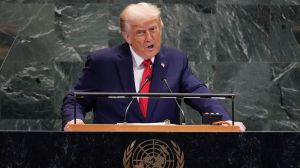Stay updated with the latest - Click here to follow us on Instagram
Punjab and Haryana HC allows undertrial in Mohali jail to marry
Justice Rakesh Kumar Jain allowed Sumeet Bajwa’s petition seeking directions to the concerned authorities to grant her permission to marry Sanvir Singh, the undertrial.
The Punjab and Haryana High Court on Monday allowed a Mohali girl to marry her fiancé, an undertrial in a murder case and lodged in jail.
Justice Rakesh Kumar Jain allowed Sumeet Bajwa’s petition seeking directions to the concerned authorities to grant her permission to marry Sanvir Singh, the undertrial.
Sumeet (30), who is a Ph.D holder, was engaged to Sanvir before his arrest in February 2013. He is an accused in the murder of Mohali advocate Amarpreet Singh Sethi. The high court is yet to release the detailed judgment in the case.
Sumeet had approached Mohali jail authorities last year but her permission to marry Sanvir was rejected. Sanvir too had had pleaded before a Mohali court in 2014 for permission to marry but this too was rejected.
Thereafter, Sumeet chose to approach the High Court in February this year. She argued that her rights were being denied. Appearing for the Sumeet, advocate Surya Prakash argued that till date though there is no such provision in law but marriage is a fundamental right and it should be treated under Article 21 of the Constitution (Protection of life and personal liberty).
Amarpreet Singh Sethi, a Mohali-based advocate, was allegedly shot dead by the accused in 2013 over a petty parking space dispute in Phase 3-A. In all, nine accused, including Sanvir Singh, some of whom were staying as paying guests in the area, were arrested. Two people accompanying Sethi were also injured allegedly in the incident.
The Mohali district court had, in November 2013, framed charges against all the accused for murder, attempt to murder, rioting with deadly weapons, criminal intimidation, endangering lives, criminal conspiracy and causing damage to property.
Inmates’ rights
In January this year, the Punjab and Haryana High Court had ruled that ‘right to life and personal liberty’ guaranteed by the Constitution of India included the right of convicts or jail inmates to have conjugal visits or artificial insemination, which is to be regulated by a legally established procedure and that allowing it was the sole prerogative of the state.







